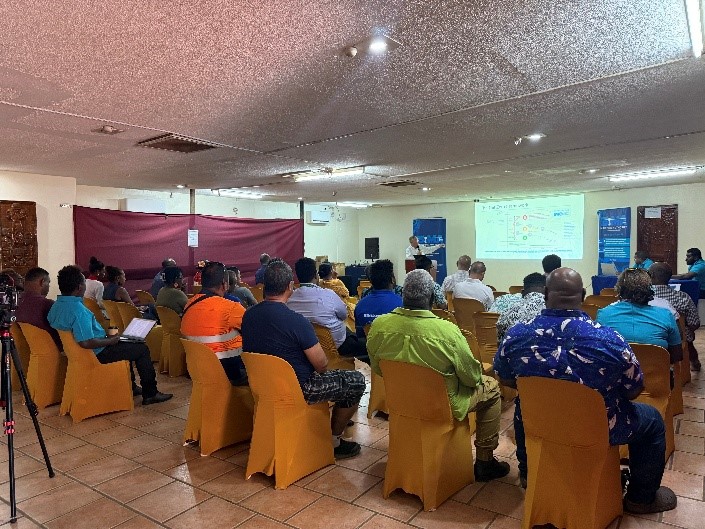The seminar was convened to present updates and obtain feedback from national stakeholders on the Solomon Islands’ approach to climate regulation in shipping. It highlighted how the country, through the expertise of Dr. Michael Prehn, contributes to shaping decisions at the IMO, while also presenting the Solomon Islands Plan for a Sustainable Maritime Future. The National Action Plan (NAP) was presented to inform stakeholders that it is ready for implementation, and under the Net-Zero Framework of MARPOL Annex VI, revenue distribution mechanisms may include support for NAP implementation. This would enable specific projects in the domestic shipping and port sectors of the Solomon Islands. The objective was to build national understanding, secure ownership, and ensure Solomon Islands’ priorities are effectively represented in international maritime climate negotiations.

Dates: Tuesday 30 September 2025.
Location: King Solomon Hotel, Honiara.
The National Seminar on Shaping Climate Regulation of Shipping at the IMO opened with remarks from Mr. Allen Ofea, Manager of the Executive Office. He began by acknowledging the distinguished presence of Dr. Michael Prehn, noting his extensive experience as a negotiator at the International Maritime Organization for the past 25 years. Mr. Ofea highlighted that for the last eight years, Dr. Prehn has represented the Solomon Islands at the IMO, particularly within the Marine Environment Protection Committee (MEPC), where his technical expertise and consistent advocacy have significantly advanced the country’s maritime interests. Mr. Ofea welcomed participants and emphasized the importance of the seminar as a national platform for reflection and strategic coordination. He expressed confidence that the discussions ahead would
generate valuable insights to guide the Solomon Islands’ future engagement in shaping climate regulation at the IMO.


Dr. Michael Prehn delivered a presentation on the evolving climate regulations of international shipping under the IMO. Drawing on his 25 years of experience as an IMO negotiator and 8 years working for Solomon Islands in the IMO, he explained why the IMO remains the only global forum capable of enforcing universal rules for shipping, with decisions that carry implications for the Solomon Islands.
He outlined the proposed IMO Net Zero Framework, noting its aim to implement the 2023 GHG Strategy. While the framework promises efficiency gains, potential revenue for SIDS including Solomon Islands, and subsidies for cleaner fuels, Dr. Prehn stressed that it remains uncertain whether it will deliver the Paris Agreement’s 1.5°C target. He emphasized that costs for shipping will rise, efficiency will become increasingly important, and expectations around fuels and infrastructure could shape markets even before regulations take full effect.
Reflecting on past IMO negotiations, Dr. Prehn highlighted the decisive role of chairs, the power of agenda-setting, and the reality that influence is not strictly tied to state size or wealth. Small states, such as the Solomon Islands, can shape outcomes through strategic positioning, alliances, and persistence- even when negotiating from a weaker position.
His key message was that while the IMO process is complex and often dominated by larger players, Pacific Island states like Solomon Islands can still exert meaningful influence if they act with clarity, unity, and foresight. The challenge ahead will be to balance global commitments with domestic realities in order to safeguard Solomon Islands’ shipping sector while contributing to international climate goals.


Mr. Allen Ofea, Manager, Executive Office at SIMA presented the National Action Plan (NAP) “Solomon Islands Plan for a Sustainable Maritime Future” as a key step in advancing the Solomon Islands’ commitment to sustainable maritime development. He outlined the process undertaken to develop the NAP, emphasizing the extensive consultations with national stakeholders, alignment with regional and international frameworks such, and integration of local priorities for resilient maritime transport.
Mr. Ofea also highlighted the content of the NAP, which sets out the country’s roadmap for reducing emissions, adopting cleaner fuels, and improving shipping efficiency, while also identifying opportunities for capacity-building, infrastructure development, and partnerships. Importantly, he confirmed that the Cabinet has formally endorsed the NAP, giving it full government backing as the Solomon Islands Plan for a Sustainable Maritime Future.
His presentation underscored the importance of national ownership, inter-agency collaboration, with the support of the GreenVoyage2050 project management Unit at IMO to ensure effective implementation of the plan and its contribution to both domestic resilience and global climate action.
A presentation summarizing the outcomes of the Seminar on Influencing the Climate Regulation of Shipping in the IMO was delivered by Mr. Ofea. His key messages included: